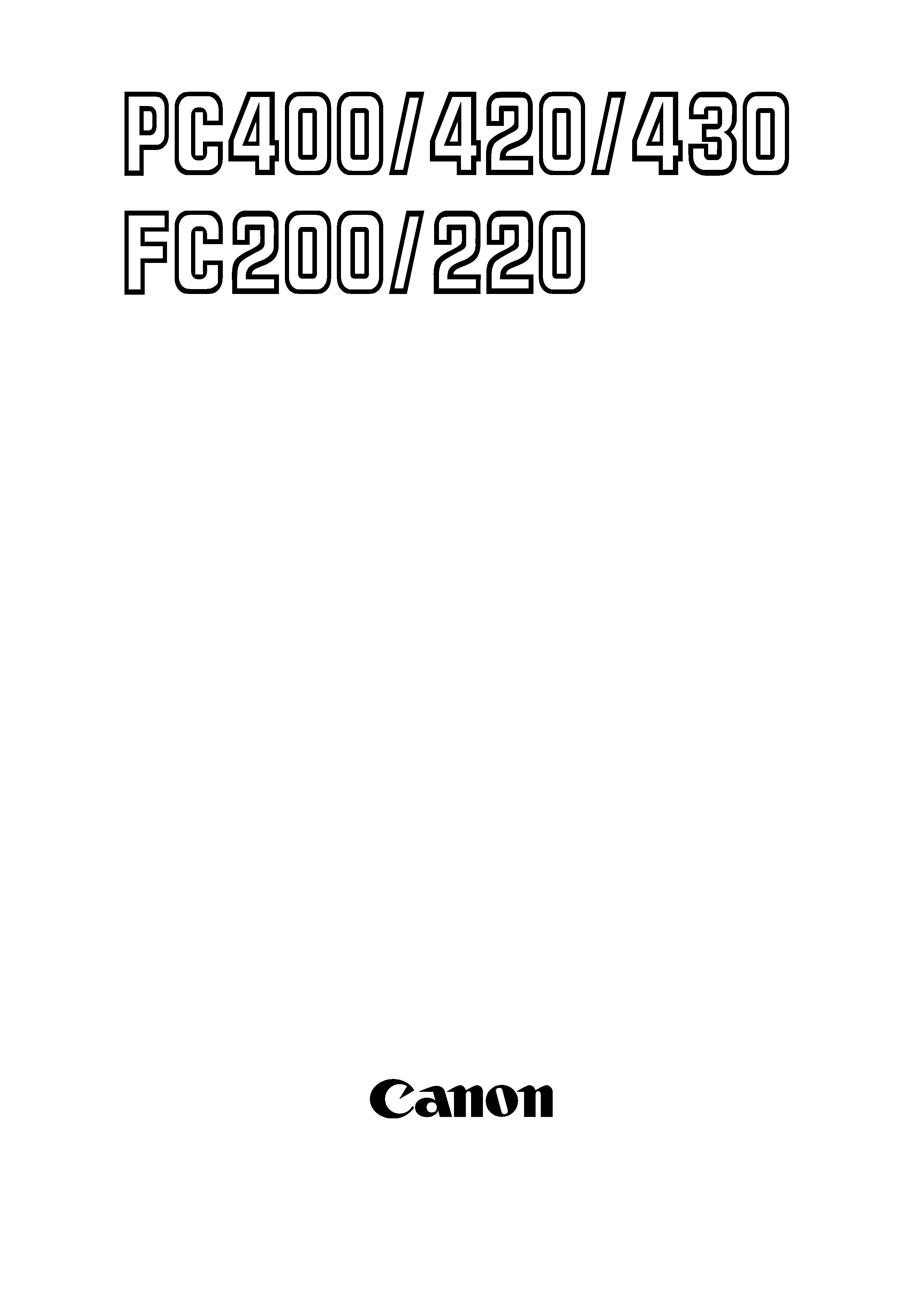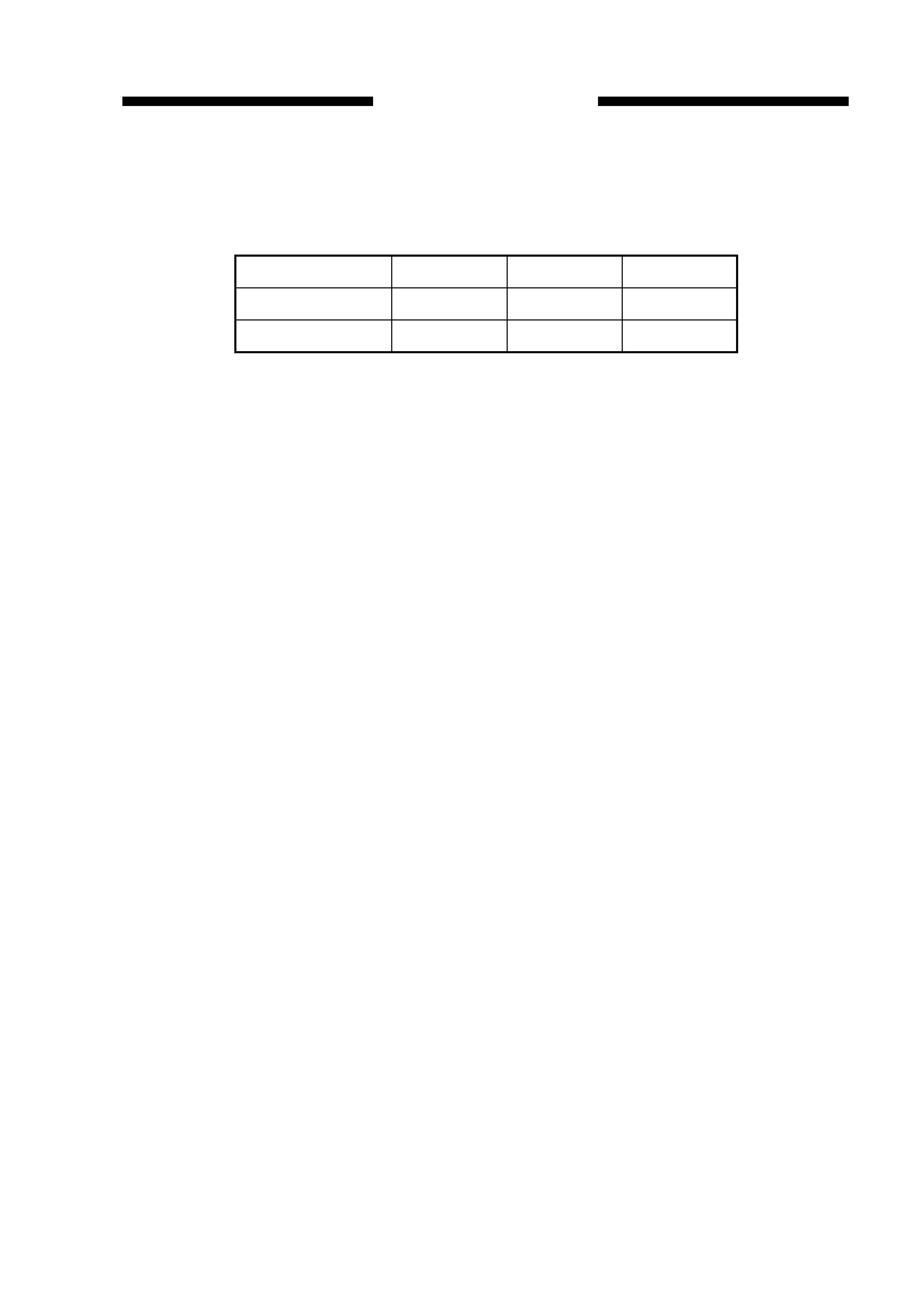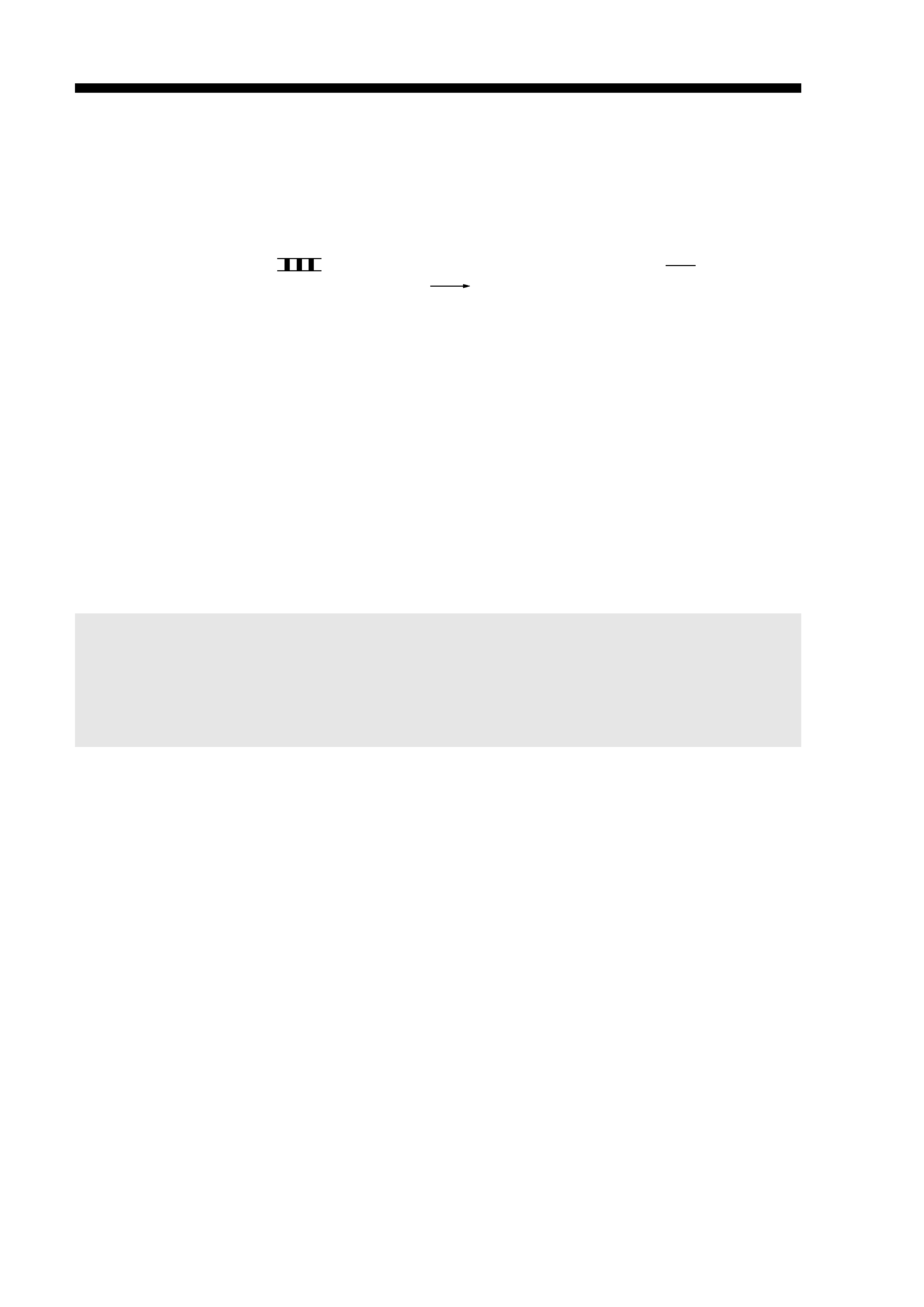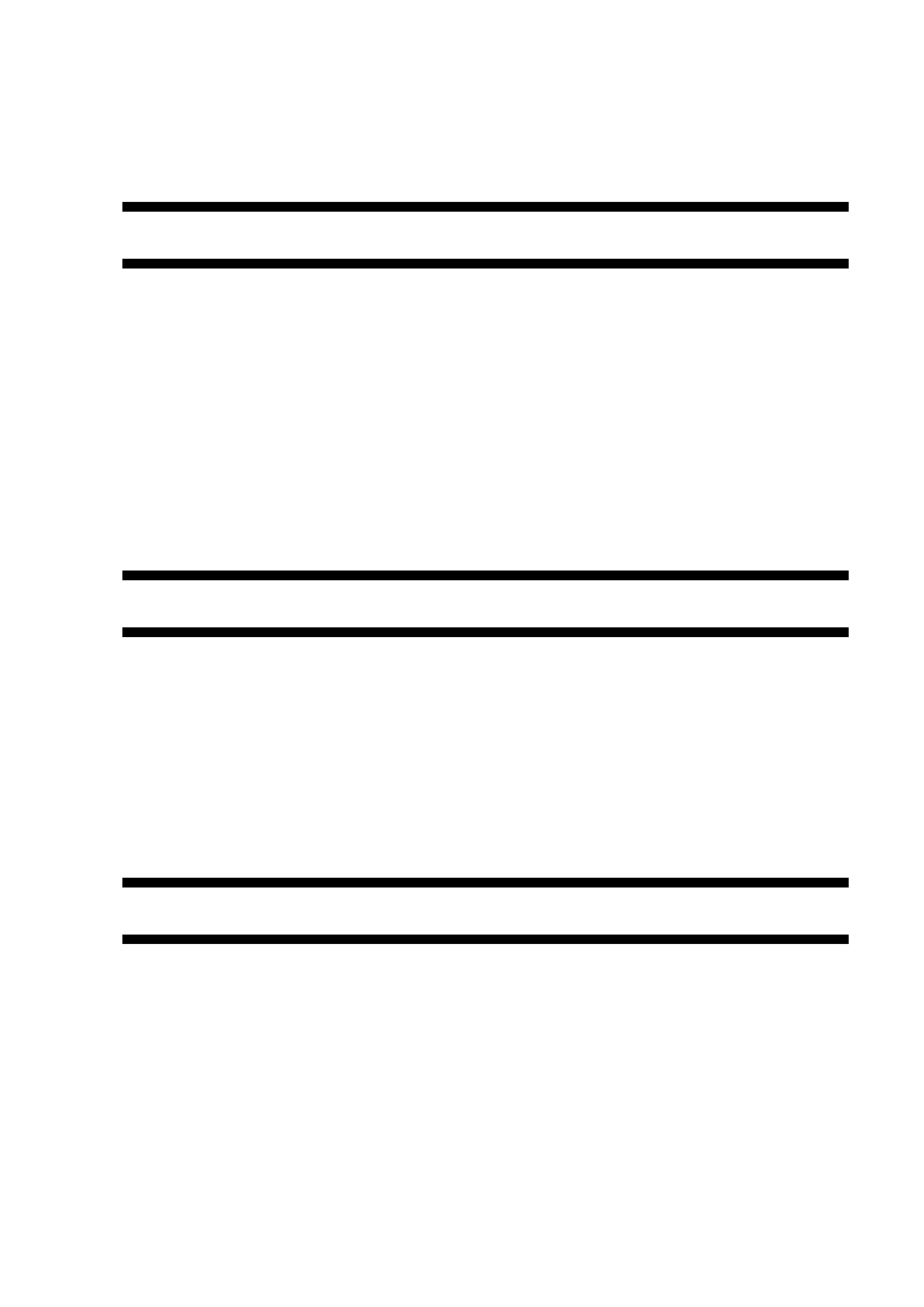
COPYRIGHT © 1998 CANON INC.
CANON PC400/420/430,FC200/220 REV.0 JAN.1998 PRINTED IN JAPAN (IMPRIME AU JAPON)
SERVICE
MANUAL
REVISION 0
FY8-13F2-000
JAN.1998

COPYRIGHT © 1998 CANON INC.
CANON PC400/420/430,FC200/220 REV.0 JAN.1998 PRINTED IN JAPAN (IMPRIME AU JAPON)
IMPORTANT
Use of this manual should be strictly
supervised to avoid disclosure of
confidential information.
THIS DOCUMENTATION IS PUBLISHED BY CANON INC., JAPAN, TO SERVE AS A
SOURCE OF REFERENCE FOR WORK IN THE FIELD.
SPECIFICATIONS AND OTHER INFORMATION CONTAINED HEREIN MAY VARY
SLIGHTLY FROM ACTUAL MACHINE VALUES OR THOSE FOUND IN ADVERTISING AND
OTHER PRINTED MATTER.
ANY QUESTIONS REGARDING INFORMATION CONTAINED HEREIN SHOULD BE
DIRECTED TO THE COPIER SERVICE DEPARTMENT OF THE SALES COMPANY.
THIS DOCUMENTATION IS INTENDED FOR ALL SALES AREAS, AND MAY CONTAIN
INFORMATION NOT APPLICABLE TO CERTAIN AREAS.
COPYRIGHT © 1998 CANON INC.
Printed in Japan
Imprimé au Japon
Prepared by
OFFICE IMAGING PRODUCTS TECHNICAL SUPPORT DEPARTMENT 1
OFFICE IMAGING PRODUCTS TECHNICAL SUPPORT DIVISION
CANON INC.
5-1, Hakusan 7-chome, Toride-shi, Ibaraki 302 Japan

COPYRIGHT © 1998 CANON INC.
CANON PC400/420/430,FC200/220 REV.0 JAN.1998 PRINTED IN JAPAN (IMPRIME AU JAPON)
i
This Service Manual provides information needed to service the plain paper copiers
FC200/PC400(120V model), FC220/PC420(120V model), and PC430(LGL model) in
the field.
The FC200/PC400 differs from the FC220/PC420/PC430 for the following:
INTRODUCTION
This Service Manual consists of the following chapters:
CHAPTER 1, "General Description," introduces the copier's features and specifica-
tions, shows how to operate the copier, and explains how copies are made.
CHAPTER 2, "Basic Operation," provides outlines of the copier's various mechanical
workings.
CHAPTER 3, "Exposure System," discusses the principles of operation used for the
copier's lens drive unit and scanner drive unit. It also explains the timing at which these
drive units are operated, and shows how they may be disassembled/assembled and
adjusted.
CHAPTER 4, "Image Formation System," discusses the principles of how images
are formed. It also explains the timing at which the various units involved in image for-
mation are operated, and shows how they may be disassembled/assembled and adjust-
ed.
CHAPTER 5, "Pick-Up/Feeding System," explains the principles used from when
copy paper is picked up to when a copy is delivered in view of the functions of electrical
and mechanical units and in relation to their timing of operation. It also shows how these
units may be disassembled/assembled and adjusted.
CHAPTER 6, "Fixing System," explains the principles used to fuse toner images to
transfer media in view of the functions of electrical and mechanical units and in relation
to their timing of operation. It also shows how these units may be disassembled/assem-
bled and adjusted.
CHAPTER 7, "Externals/Auxiliary Mechanisms," shows the copier's external parts,
and explains the principles used for the copier's various control mechanisms in view of
the functions of electrical and mechanical units and in relation to their timing of opera-
tion. It also shows how these units may be disassembled/assembled and adjusted.
CHAPTER 8, "Installation," introduces requirements for the site of installation, and
shows how the copier may be installed using step-by-step instructions.
CHAPTER 9, "Maintenance and Servicing," provides tables of periodically replaced
parts and consumables/durables and scheduled servicing charts.
CHAPTER 10, "Troubleshooting," provides tables of maintenance/inspection, stan-
dards/adjustments, and problem identification (image fault/malfunction).
Appendix contains a general timing chart and general circuit diagrams.
Model
Manual pick-up
Multifeeder
AE
FC220/PC420/PC430 Not available
Available
Available
FC200/PC400
Available
Not available
Not available

COPYRIGHT © 1998 CANON INC.
CANON PC400/420/430,FC200/220 REV.0 JAN.1998 PRINTED IN JAPAN (IMPRIME AU JAPON)
ii
The following rules apply throughout this Service Manual:
1. Each chapter contains sections explaining the purpose of specific functions and
the relationship between electrical and mechanical systems with reference to the
timing of operation.
In the diagrams,
represents the path of mechanical drive
where a sig-
nal name accompanies the symbol
, the arrow indicates the direction of the
electric signal.
The expression "turn on the power" means flipping on the power switch, closing
the front door, and closing the delivery unit door, which results in supplying the
machine with power.
2. In the digital circuits, '1' is used to indicate that the voltage level of a given signal
is "High," while '0' is used to indicate "Low." (The voltage value, however, differs
from circuit to circuit.)
In practically all cases, the internal mechanisms of a microprocessor cannot be
checked in the field. Therefore, the operations of the microprocessors used in the
machines are not discussed: they are explained in terms of from sensors to the
input of the DC controller PCB and from the output of the DC controller PCB to
the loads.
Note:
The descriptions in this Service Manual are subject to change without notice for
product improvement or other purposes, and major changes will be communicated
in the form of Service Information bulletins.
All service persons are expected to have a good understanding of the contents of
this Service Manual and all relevant Service Information bulletins and be able to
identify and isolate faults in the machine.

COPYRIGHT © 1998 CANON INC.
CANON PC400/420/430,FC200/220 REV.0 JAN.1998 PRINTED IN JAPAN (IMPRIME AU JAPON)
iii
CONTENTS
CHAPTER 1 GENERAL DESCRIPTION
I.
FEATURES ..................................1-1
II.
SPECIFICATIONS .......................1-2
III. NAMES OF PARTS .....................1-4
A.
External View ..........................1-4
B.
Cross Section .........................1-5
IV. OPERATION ................................1-6
A.
Control Panel ..........................1-6
1.
PC420/430/FC220 .............1-6
2.
PC400/FC200 ....................1-7
B.
Making Copies ........................1-8
C. Jam Indicator.........................1-11
D. Add Paper Indicator ..............1-11
E.
Replacing the Cartridge ........1-11
1.
Time to Replace the Cartridge
.........................................1-11
2.
Replacing the Cartridge ...1-12
F.
Changing the Density ...........1-14
G. Cleaning................................1-14
1.
Copyboard Glass/Copyboard
Cover ...............................1-14
2.
Lens Array .......................1-15
3.
Pick-Up Roller..................1-16
H. When Not Using the Copier for a
Long Time .............................1-16
V.
IMAGE FORMATION .................1-17
A. Outline.....................................1-17
CHAPTER 2 BASIC OPERATION
I.
BASIC OPERATION ....................2-1
A.
Outline ....................................2-1
B.
Outline of Electrical Circuit......2-2
C. Basic Sequence of Operations
(A4, 2 copies)..........................2-3
D. Main Motor Control Circuit ......2-5
1.
Outline ...............................2-5
2.
Operation ...........................2-5
3.
Overcurrent Sensor ...........2-5
E.
Inputs to DC Controller ...........2-6
1.
Inputs to DC Controller (1/2)
...........................................2-6
2.
Inputs to DC Controller (2/2)
...........................................2-7
F.
Outputs from DC Controller ....2-8
1.
Outputs from DC Controller
(1/2) ...................................2-8
2.
Outputs from DC Controller
(2/2) ...................................2-9
CHAPTER 3 EXPOSURE SYSTEM
I.
EXPOSURE/COPYBOARD DRIVE
SYSTEM ......................................3-1
A.
Outline of Exposure System ...3-1
B.
Copyboard Drive System ........3-1
1.
Outline ...............................3-1
2.
Controlling the Copyboard
Drive ..................................3-3
3.
Mechanism of Copyboard
Drive Assembly..................3-4
II.
Controlling the Scanning Lamp....3-7
A.
Outline ....................................3-7
B.
Operations ..............................3-8
1.
Turning the Scanning Lamp
ON and OFF ......................3-8
2.
Controlling the Intensity of the
Scanning Lamp..................3-8
C. Controlling the Intensity of the
Scanning Lamp (VR604) ........3-8
III. MECHANICAL SYSTEM..............3-9
A.
Scanning System ..................3-10
1.
Detaching the Scanning Lamp
Unit ..................................3-10
B.
Copyboard Drive Assembly...3-11
1.
Detaching the Copyboard
Drive Assembly ................3-11
